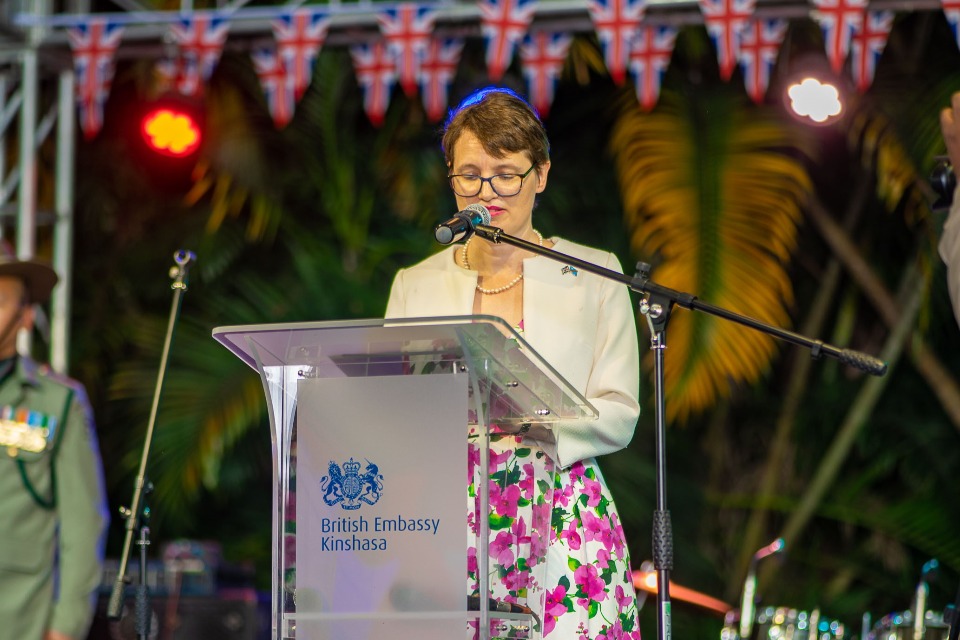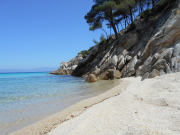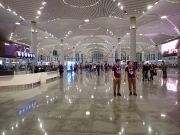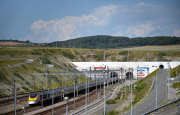
His Majesty's Ambassador to the Democratic Republic of Congo Alyson King's speech on the King's Birthday Party delivered on 19 June.
Your Excellency the President of the Republic, represented here by his principal advisor in charge of the College of Environment, Urban Planning and Mobility, HE Ambassador Tosi Mpanu Mpanu,
Honourable Senators and Members of Parliament,
Your Excellencies, distinguished members of the national and provincial governments, and their representatives here present,
Madam SRSG and Head of MONUSCO,
Excellencies, my fellow Ambassadors and heads of international organisations,
Dear members of the diplomatic corps and international organisations,
Distinguished religious and civil authorities, members of political parties,
Dear partners,
Eminent representatives of civil society and the world of culture,
Ladies and Gentlemen,
Distinguished guests,
Dear friends,
All protocol observed
Boyei malamu na moto nyonso! (Welcome to everyone!)
Thank you all for coming. Your presence helps to create a special atmosphere as we celebrate the official birthday of King Charles III. It’s also an opportunity to celebrate the links between the UK and the DRC.
The UK established its first diplomatic mission here in 1902, when a British consulate was built in the then capital, Boma.
But even though our relationship is 123 years old this year, I think we’re just getting started!
I’m going to repeat what I said last year:
We still do not know each other as well as we might. It remains my firm conviction that the more we know and understand each other, the more opportunities we will find to do good things together.
That’s enough recycling, at least for words!
The past year has been marked by undeniably negative events, and I’d like to say a few words about them before turning to more encouraging aspects.
In January, the battle for Goma began when Rwandan troops and the M23 attacked. Many civilians died, as did members of MONUSCO and SAMIDRC. Many people were forced to move - once again - and numerous human rights violations were committed by all the actors on the ground. I was forced to close our office in Goma.
A few days later, several embassies - both African and Western - and diplomatic residences in Kinshasa were attacked and looted. Perhaps the oldest principle of international public law is “don’t shoot the messenger”. Peaceful demonstration is an essential democratic right and freedom; as diplomats, we are there to understand and convey messages, particularly when the situation is difficult. But this type of violence is unacceptable and counter-productive. It delayed the international response to events in the east of the country rather than encouraging it.
Today, a record 5 million people live under occupation in the east of the DRC, under the administration of a UN-sanctioned rebel group.
I want to be very clear.
The UK Government condemns the actions of all illegal armed groups in eastern DRC, including the M23. The UK Government has expressed its deep concern about the support of the Rwandan Defence Forces (RDF) to the M23 in offensives that violate the territorial integrity of the Democratic Republic of Congo. In response, the UK Government has announced a major reassessment of its policy towards Kigali, including the suspension of the majority of its financial support.
Security Council Resolution 2773, adopted unanimously by its 15 members, calls for the immediate and unconditional withdrawal of the M23 and the RDF. It has not yet been implemented. We welcome all the efforts currently being made to find a political solution to this situation.
At a time when the international system based on norms and international law is being called into question, whether in the Middle East, Ukraine, Sudan or the DRC, leadership is required more than ever.
This leadership must be both courageous and wise, ready to take the necessary difficult measures and brave reforms.
Against this backdrop, there are many reasons to be optimistic about relations between the UK and the DRC.
You’ll see many examples of our collaboration in this garden.
I’m delighted to welcome back some of our Chevening alumni, and even more delighted to announce that we are increasing the number of scholarships available to talented young Congolese leaders to study for a Masters degree, fully funded by the UK, in the UK.
Much of the UK’s work in the country is targeted at communities in the east. For example, new UK funding will provide clean water and sanitation to around 200,000 displaced people, in partnership with UNICEF and the SAFER consortium.
On this day, International Day for the Elimination of Sexual Violence in Conflict, I would like to underline the priority that the UK Government gives to supporting survivors of sexual violence and fighting impunity. I reiterate my congratulations to the DRC for being the first state in the world to condemn the crime of forced pregnancy. I hope we can work together to provide global leadership on these vital issues in the years ahead.
We congratulate the DRC on its election to the Security Council as of 1 January and look forward to working together on issues crucial to international peace and security.
In the field of health, our partnerships with UNICEF and the WHO are supporting the government’s response to the ongoing Mpox and cholera epidemics, and helping more than 4.4 million Congolese people. I was delighted to meet some Mpox survivors in Kinshasa recently; one young man thought he would never get out of hospital alive because he was so ill. Looking at him today, you’d never guess, he’s so healthy and cheerful.
On climate and the environment, the UK co-chairs the Donor College of the Congo Basin Forest Partnership in the Central African Forest Initiative (CAFI). Our new £90 million action programme supports local communities around the Yangambi Biosphere Reserve, improving economic livelihoods while preserving forests and nature.
And I’m proud that our programme is also building the DRC’s capacity in climate science in collaboration with British universities.
I would like to salute the work of the Head of State, for his renewed commitment to economic reform. Tangible improvements to the business climate, such as simpler and more predictable procedures and taxation, as well as greater transparency, will attract foreign direct investment and lead to the creation of well-paid jobs.
British companies have shown their interest in the economic potential of the DRC. For example, British International Investment’s investment alongside DP World in the DRC’s first deep-water container port at Banana will open up new infrastructure and international trade opportunities for the country.
As a global centre of mining expertise, trade and finance, the UK is particularly well placed to support the DRC’s ambition to develop its mining sector and bring its critical minerals, which are vital to global economies, to all Congolese.
This evening, I’m delighted that several Congolese companies with links to the UK are here, and in particular several of them have been able to contribute to this fantastic event.
I would like to thank our generous sponsors: Socimex, Rawbank, Vodacom, G4S, Helios Towers, HJ Hospital, Médecins de Nuit, Diageo, Canalbox, Manga Flore Gardening Services, Centre Médical Diamant and BAM’s Clean, without whom this evening would not have been possible.
My thanks also go to my team who work tirelessly, not just for this event, but also for their dedication on a daily basis enabling the Embassy to function well and for us make a difference.
Dear guests,
Ladies and Gentlemen,
The Democratic Republic of Congo is an important partner and friend for the United Kingdom. In recent years, the ties of friendship between our two countries have grown stronger. H.E. President Felix Tshisekedi was one of the first heads of state to meet His Majesty King Charles III after his accession to the throne.
We salute the work of H.E. Mrs Judith Suminwa, the first female Prime Minister of the DRC, and all the members of the Government present here today.
My country’s wish is to embark on the next phase of this relationship, working in collaboration with the DRC’s leaders, civil society, businesses and health and climate experts.
I sincerely hope that we’ll get to know each other better and that we’ll achieve even more great things together.
Here’s to the next 123 years of friendship!
Feti malamu (Enjoy the party!)






































